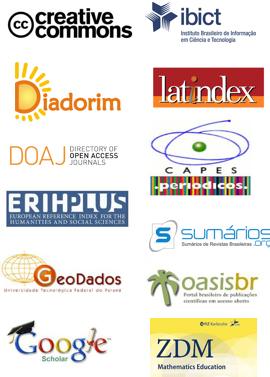O Que é e ao Que Serve a Hermenêutica?
DOI:
https://doi.org/10.17921/2176-5634.2018v11n2p194-200Resumo
Este artigo foi incitado pela propagação aparentemente crescente - somente no Brasil - de um referencial teórico metodológico, na área de pesquisa em história do ensino da matemática: a “hermenêutica de profundidade”. Como se revela que este conceito constitui uma transformação – sim, “profunda” – do conceito original da hermenêutica e para fins bem diferentes – análises sociológicas de indicadores de ideologia nas mass media modernas -, o artigo explicita as intenções que levaram às tentativas de utilizar este referencial: a intenção de análises do contexto sociocultural de livros textos. Em vez de esforços complicados de re-transformar aquele referencial para o uso tencionado, o artigo mostra que tais desvios não são necessários e que já existem padrões suficientes para análises contextualizadas de livros texto. Assim, o artigo apresenta o conceito original da hermenêutica assim como seu desenvolvimento – em particular na filosofia alemã. Enquanto este desenvolvimento resultou na dominância de uma vertente subjetiva, o artigo enfatiza que tal vertente não é adequada para analisar textos científicos e argumenta a favor de uma hermenêutica material ou objetiva.
Palavras-chave: Profundidade. Análise Sócio-Cultural. Hermenêutica Subjetiva Versus Objetiva ou Material.
Abstract
This article was prompted by the apparently growing propagation – actually, only in Brazil - of a theoretical methodological approach
in the area of research into the history of mathematics teaching: “hermeneutics of profoundness”. As it will be revealed that this concept
constitutes a transformation – in fact, a “profound” one - of the original concept of hermeneutics, undertaken for very different aims, namely
sociological analyses of indicators of ideology in the modern mass media -, this article explains the intentions that led to the attempts to use
this approach: the intention of analysing the sociocultural context of (mathematics) textbooks. Instead of complicated efforts to re-transform
that approach for the intended use, the article shows that such deviations are not necessary and that there exist already sufficient conceptions for contextualized textbook analysis. Thus, the article presents the original concept of hermeneutics as well as its development - in particular in German philosophy. While this development resulted in the dominance of a subjective strand, the article emphasises that this tendency is not adequate for analysing scientific texts and argues for material or objective hermeneutics.
Keywords: Profoundness. Sócio-Cultural Analysis. Subjective vs. Objective or Material Hermeneutics.
Referências
Andrade, Miriam Maria (2012). Ensaios sobre o Ensino em Geral
e o de Matemática em particular, de Lacroix: Análise de
uma forma simbólica à luz do referencial metodológico da
Hermenêutica de Profundidade. 2012. Tese (Doutorado em
Educação Matemática) – Instituto de Geociências e Ciências
Exatas do Campus de Rio Claro, UNESP, Rio Claro.
Bollack, Jean (1989). “Un futur dans le passé. L‘herméneutique
matérielle de Peter Szondi,” Introduction à l‘herméneutique
littéraire, Peter Szondi (Paris: Éd. du Cerf, 1989), I–XVII.
Cardoso, V. C. (2009). A Cigarra e a Formiga: uma reflexão sobre
a Educação Matemática brasileira da primeira década do século XXI. Tese (Doutorado em Educação) Faculdade de
Educação – UNICAMP. Campinas.
Fernando Guedes & Larissa Cristina Alves (2015). Hermenêutica
de Profundidade como Possibilidade de Pesquisa
Historiográfica em Educação Matemática. Em: Anais do XI
Seminário Nacional de História da Matemática. Natal.
Lacroix, Sylvestre-François (2013). Ensaios sobre o ensino em
geral e o de Matemática em particular. Tradução de Karina
Rodrigues; revisão, posfácio e notas de Antonio Vicente
Marafioti Garnica e Maria Laura Magalhaes Gomes. São
Paulo: Editora UNESP.
Madrid, M. J., Maz-Machado A, León-Manteiro C., & López-
Esteban C. (2017). Aplicaciones de las Matemáticas a la Vida
Diaria en los Libros de Aritmética Españoles del Siglo XVI.
BOLEMA, 31, (59), 1082-1100.
Oliveira, F. D., Andrade, MM & Silva, TTP (2013. A hermenêutica
de profundidade: possibilidades em educação matemática,
Alexandria - Rev Educ Ciênc Tecnol, 6, (1), 119-42.
Ricoeur, P (1969). Le conflit des interprétations. Paris: Seuil.
Schleiermacher, F. D (1959). Hermeneutik. Nach den
Handschriften neu herausgegeben und eingeleiet von Heinz
Kimmerle. Heidelberg: Winter.
Schubring, G. (1987). On the methodology of analysing historical
textbooks: Lacroix, 7,(3), 4151.
Schubring, Gert (2005). Conflicts between Generalization, Rigor
and Intuition. Number Concepts Underlying the Development
of Analysis in 17th-19th Century France and Germany.
Sources and Studies in the History of Mathematics and
Physical Sciences. New York: Springer.
Silva, TTP & Otero-Garcia S.C. (2012). A Hermenêutica
de Profundidade e suas Possibilidades para Educação
Matemática. In: Anais do V Seminário Internacional de
Pesquisa em Educação Matemática. Petropólis.
Souza, L. J. (2016). Resenha da tese de doutorado de M. M.
Andrade, BOLEMA, 30, (56), 1319-24.
Thompson, J.B. (1995). Ideologia e Cultura Moderna: Teoria
social crítica na era dos meios de comunicação de massa.
Petrópolis: Vozes.
Wolf, F. A. (1839). Vorlesung über die Encyclopaedie der
Alterthumswissenschaft. Leipzig: Lehnhold.


